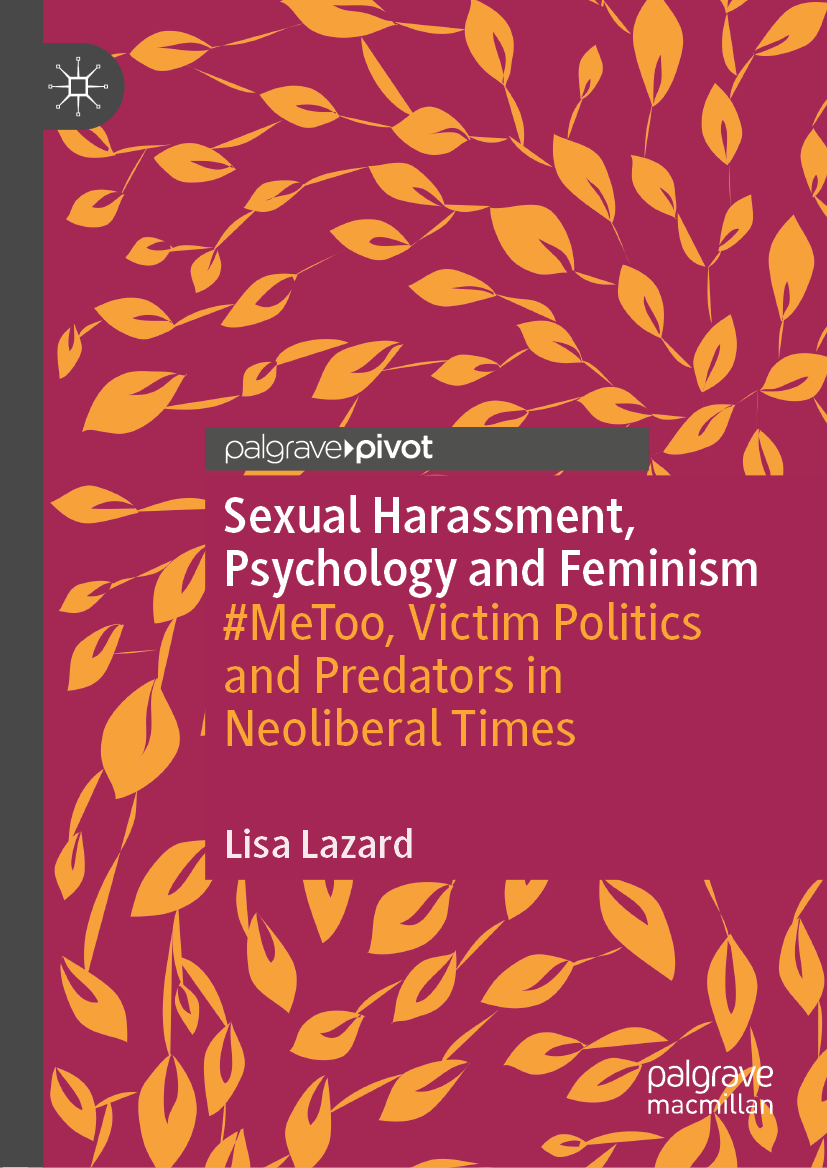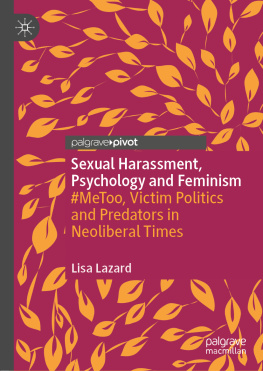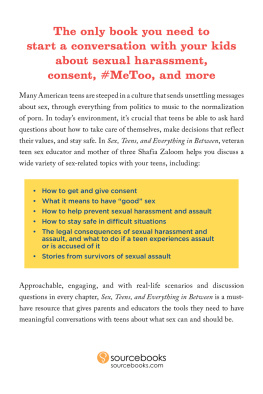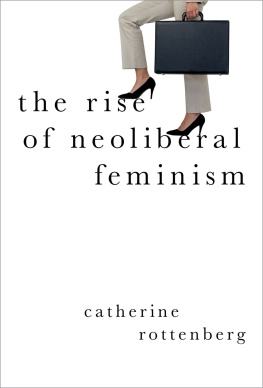Lisa Lazard - Sexual Harassment, Psychology and Feminism: #MeToo, Victim Politics and Predators in Neoliberal Times
Here you can read online Lisa Lazard - Sexual Harassment, Psychology and Feminism: #MeToo, Victim Politics and Predators in Neoliberal Times full text of the book (entire story) in english for free. Download pdf and epub, get meaning, cover and reviews about this ebook. year: 2020, publisher: Springer International Publishing, genre: Romance novel. Description of the work, (preface) as well as reviews are available. Best literature library LitArk.com created for fans of good reading and offers a wide selection of genres:
Romance novel
Science fiction
Adventure
Detective
Science
History
Home and family
Prose
Art
Politics
Computer
Non-fiction
Religion
Business
Children
Humor
Choose a favorite category and find really read worthwhile books. Enjoy immersion in the world of imagination, feel the emotions of the characters or learn something new for yourself, make an fascinating discovery.
- Book:Sexual Harassment, Psychology and Feminism: #MeToo, Victim Politics and Predators in Neoliberal Times
- Author:
- Publisher:Springer International Publishing
- Genre:
- Year:2020
- Rating:5 / 5
- Favourites:Add to favourites
- Your mark:
- 100
- 1
- 2
- 3
- 4
- 5
Sexual Harassment, Psychology and Feminism: #MeToo, Victim Politics and Predators in Neoliberal Times: summary, description and annotation
We offer to read an annotation, description, summary or preface (depends on what the author of the book "Sexual Harassment, Psychology and Feminism: #MeToo, Victim Politics and Predators in Neoliberal Times" wrote himself). If you haven't found the necessary information about the book — write in the comments, we will try to find it.
Lisa Lazard: author's other books
Who wrote Sexual Harassment, Psychology and Feminism: #MeToo, Victim Politics and Predators in Neoliberal Times? Find out the surname, the name of the author of the book and a list of all author's works by series.
Sexual Harassment, Psychology and Feminism: #MeToo, Victim Politics and Predators in Neoliberal Times — read online for free the complete book (whole text) full work
Below is the text of the book, divided by pages. System saving the place of the last page read, allows you to conveniently read the book "Sexual Harassment, Psychology and Feminism: #MeToo, Victim Politics and Predators in Neoliberal Times" online for free, without having to search again every time where you left off. Put a bookmark, and you can go to the page where you finished reading at any time.
Font size:
Interval:
Bookmark:


Cover illustration: Melisa Hasan
This Palgrave Pivot imprint is published by the registered company Springer Nature Switzerland AG
The registered company address is: Gewerbestrasse 11, 6330 Cham, Switzerland
There are many people that I owe a debt of gratitude to for their incredibly generous support of this project. First and foremost, I would like to thank Rose Capdevila for her encouragement and friendship over the last 20 years. This book began in a conversation that Rose and I had about 6 years ago. We were discussing the fact that no one really seemed to talk about sexual harassment anymore and why the issue had lost relevance. The visibility of the issue now still seems extraordinary to me given that conversation happened in the not so distant past. I am grateful for Stephanie Taylors support during the writing of this book and her insightful comments on earlier draft chapters. I would also like to thank Sarah Crafter, Lauren McCallister, Kate Milnes, Brigette Rickett, Martin Tolley and the Open Universitys CuSP research group, for their incisive comments on chapter drafts. I am particularly grateful to Sarah Wakelin, Jess Wakelin and Lauren Wright for reading the last draft over so carefully. I also would like to thank Calen and Mark Wakelin for allowing this task to take over their household for a week. It is impossible to express my love and gratitude for my partner Richard, who has provided me with immeasurable support in this process. I am also especially grateful to my family but particularly Cleo and Dexter who tolerated my distraction with kindness and understanding. This book is dedicated to Cleo, Dexter, Aria, Vicky and Chay, with love. This book is also dedicated to Marcia Worrell, a brilliant academic and a wonderful friend.
In this chapter, Lazard offers a brief history of how sexual harassment has been understood in feminism scholarship and activism since the emergence of the term in the 1970s. The chapter explores how feminist theorisation has drawn attention to how cultural scripts for heterosexuality has prescribed gendered sexual subjectivities in which women are positioned as sexually passive and constrained in relation to men. The chapter explores recent shifts to understanding women as empowered sexual subjects which have gained prominence with the ascendency of postfeminism and neoliberal feminist ideas in popular culture. This chapter sets the scene for a broader explanation of how postfeminism and neoliberal feminism has shaped contemporary understandings of sexual harassment and resistance to it.
If you have ever been sexually harassed or assaulted write me too in reply to this tweet. Me tooif all the women who have been sexually harassed or assaulted write me too. as a status, we might give people a sense of the magnitude of the problem. (@AlyssaMilano, 15 October 2017)
This tweet was the springboard for the meteoric rise of the # MeToo hashtag activism against sexual harassment and violence in 2017. Actress Alyssa Milano posted the tweet in amidst growing public condemnation of film producer Harvey Weinstein , whose long history of sexual violence against women was exposed by The New York Times on the 5th of October 2017 (Kantor & Twohey, ).
The supportive response to # MeToo could not be further from how the issue of sexual harassment has been treated in the not so distant past. Prior to #MeToo, relatively few people disclosed their experiences either formally or informally (e.g. Fitzgerald & Cortina, ).
How have we got from a place where victims are subject to routine social censure to one which appears more socially supportive of those harassed? How is sexual harassment made sense of and understood? What implications do such understandings have for perpetrators and victims? These questions guide the analysis of sexual harassment presented in this book. Situated within a feminist psychological framework, my aim is to explore particular shifts in the cultural landscape which are relevant to how sexual harassment has become constituted, and how this has shaped the way in which victims and perpetrators come to be understood. To set the scene for this book, I will briefly contextualise the more recent resistance to sexual harassment within the trajectory for activism and theorisation around the phenomenon. In doing so, I will explicate the feminist theoretical influences that shape the arguments in this book. At this point, I would like to add a caveatthe contexts I attend to refer largely to the US, from which # MeToo arose, and the UK, the place from which I write. As such, I make no claims that the shifts I discuss are global, complete or mark firm breaks from patterns of understanding that have been dominant. This book aims to articulate predominant understandings around sexual harassment that have been particularly relevant in the global North.
In this book, the exploration of sexual harassment starts with how it is primarily understood as something that men do, most commonly to women and, to a lesser extent, other men. This book is also concerned with how the context of work has been central in getting the issue on the public agenda. This is not to say that my analyses presumes that sexual harassment only occurs in the workplace. Rather, I start from the position that the recognition of workplace sexual harassment as a gendered phenomenon has been a key frame within which developments in feminist theorisation and activism have largely taken place. In this section, I will discuss key developments in the trajectory of sexual harassment as a social problem which shape the direction of this book.
Font size:
Interval:
Bookmark:
Similar books «Sexual Harassment, Psychology and Feminism: #MeToo, Victim Politics and Predators in Neoliberal Times»
Look at similar books to Sexual Harassment, Psychology and Feminism: #MeToo, Victim Politics and Predators in Neoliberal Times. We have selected literature similar in name and meaning in the hope of providing readers with more options to find new, interesting, not yet read works.
Discussion, reviews of the book Sexual Harassment, Psychology and Feminism: #MeToo, Victim Politics and Predators in Neoliberal Times and just readers' own opinions. Leave your comments, write what you think about the work, its meaning or the main characters. Specify what exactly you liked and what you didn't like, and why you think so.








